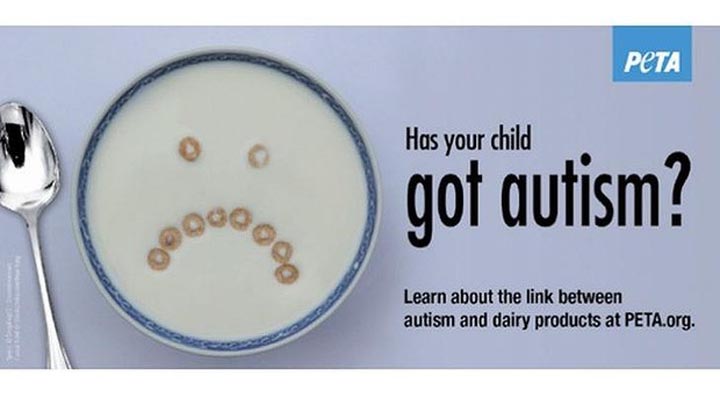TORONTO – Our parents fed it to us as kids by the carton-full. We were told it was good for our bones and our teeth. But now, in a cheeky new ad, animal rights group PETA is linking milk to autism – and the backlash is pouring in from offended autism organizations and concerned doctors.

“Got autism? Studies have shown a link between cow’s milk and autism,” the new People for Ethical Treatment of Animals advertisement reads.
The organization says it created this billboard to “alert the public” to what it alleges is a connection between autism spectrum disorder and dairy products.
“More research is needed but scientific studies have shown that many autistic kids improve dramatically when put on a diet free of dairy foods,” PETA says on its website.
READ MORE: Anti-vaccination movement means preventable diseases making a comeback
It points to two scientific studies, but critics say the research is outdated, insufficient and with small sample groups.
“One, published in 2002, observed some possible improvement in autism symptoms when children were put on a diet free of gluten, gliadin and casein, proteins found either in grains or milk. Not only is the study old, it’s vague—with the researchers broadly blaming the problem on ‘processes with opioid effect,’ whatever that means,” according to one TIME report.
The second study dates back to 1995 with just 36 subjects.
In any case, scientists haven’t drawn a line between milk and autism.
READ MORE: Despite some funding, a diagnosis of autism is a huge financial burden
A pediatrician told ABC News that the billboard is more a scare tactic than a public service announcement.
“I’m concerned more about the people who don’t have autism. They will be scared that they’ll get autism if they drink milk,” Dr. Susan McGrew said.
Finally, autism organizations aren’t happy with the advertisement either.
READ MORE: Autism treatment – a system bursting at the seams
“We think the PETA ad campaign is inappropriate because it gives a misleading impression toward a cause or a treatment for autism,” Marguerite Kirst Colston, a spokesperson for the Autism Society of America, told ABC.
Keep in mind, PETA has a history of releasing controversial ads.
For example: In 2009, a German high court banned PETA’s “Holocaust on Your Plate” display, which juxtaposed animals in slaughterhouses with images of humans in concentration camps.
carmen.chai@globalnews.ca
Follow @Carmen_Chai
- Trudeau tight-lipped on potential U.S. TikTok ban as key bill passes
- Hundreds mourn 16-year-old Halifax homicide victim: ‘The youth are feeling it’
- Canadians more likely to eat food past best-before date. What are the risks?
- On the ‘frontline’: Toronto-area residents hiring security firms to fight auto theft




Comments